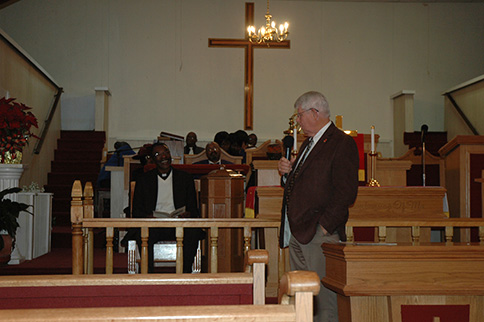
Although the deluge that continued across Atmore on Sunday, January 1, held down the attendance, it did little to dampen the spirit of those who attended Gaines Chapel AME Church’s celebration of the Emancipation Proclamation’s 154th anniversary.
Only 31 people gathered in the local church to mark the anniversary of the document that is credited with effectively ending slavery in the United States, a fact that drew comments from two of the event’s speakers.
“This ought not be just a handful of people celebrating, this house ought to be flooded with people of faithful hearts, people with grateful hearts, not just for the Emancipation Proclamation, but thanking You for seeing us through,” the Rev. Henry Hawkins said in his prayer of invocation.
Pastor Isabelle Brazzell, who spoke briefly, noted that “so many people ought to be here to praise the Lord and give Him honor, but they’re just not here.”
The rain kept the church’s praise team and the scheduled guest singers, the Atmore Fellowship Mass Choir, away. To fill the gap, the Gaines Chapel choir provided several selections, including “Lift Every Voice and Sing,” “I’ll Be Alright Someday,” “Until I found the Lord,” Standing in the Need of Prayer,” “We Shall Overcome,” “I Need Thee” and “Reach Out and Touch.”
Joydan Pleasant welcomed the small gathering, and Russell Robinson provided a brief history of the proclamation, which was issued by President Abraham Lincoln on January 1, 1863. Church pianist Urla Boggan softly played “Battle Hymn of the Republic” as Robinson spoke.
Mayor Jim Staff also spoke prior to the sermon that was delivered by retired AME minister, the Rev. Daniel Dozier.
Staff called it “an honor” to again speak at the church, where he noted that he had spoken on “two or three” other occasions.
“This church has done wonders for me, and I have always appreciated it,” the mayor said before telling Gaines Chapel Pastor Amos Smith and the other ministers that he “just can’t say enough” about the role they have played in making Atmore a quiet, peaceful community.
At the end of his remarks, Staff read a proclamation designating Sunday as “a day for all citizens to join the congregation of Gaines Chapel AME Church and observe the 154th anniversary of the symbol of equality and social justice and encourage all citizens to reflect upon the freedom afforded as a result of the Emancipation Proclamation.”
The featured speaker didn’t completely share the views of those who praised Lincoln’s signing of the document and referred to the president as The Great Emancipator.
“God is the author of our freedom,” Dozier said from the pulpit. “A lot of folk don’t seem to understand as black folk what freedom is. Don’t be fooled just because you are not wearing chains around your wrists or metal shackles around your ankles. That does not mean that you are not wearing chains and shackles.”
He added that, “the ink is still not dry on the Emancipation Proclamation” and pointed out that Lincoln was just a medium through which God freed America’s slave population.
“It was not Lincoln who freed the slaves, it was God,” he said. “Lincoln originally was indifferent to the institution of slavery. He said to let all the slaves in every state be free, or let all the states be slave states. If saving the Union meant abolishing slavery, he would abolish it. The more he put the Union first, the more God plagued him.
“When God was through with Lincoln, he (Lincoln) found out that his arms were too short to box God. God played Lincoln as he did the pharaoh in Egypt God signed the Emancipation Proclamation, not Lincoln. We need to give credit where credit is due.”
After the sermon, the Gaines Chapel pastor reflected aloud on the message.
“That was a powerful message, a message we can take and share with others,” the Rev. Smith said. “The preacher hit a point there when he first started the sermon that got my imagination going. He said that today, the black man is still not free, and I began to think about that.
“When you look around within our society of color, you see so many of our young people that are still in bondage, from drugs and all manner of deviant behavior, because we highlighted liberators who were not liberators. Jesus is our liberator; he and he alone can set us free.”
